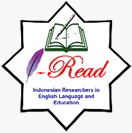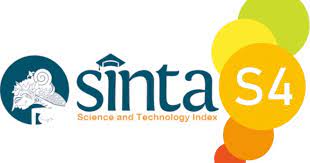Fostering Students’ Creativity in English Writing Class: Investigating The Impact of Project-Based Learning in Bridging Ideas and Words
DOI:
https://doi.org/10.22219/englie.v4i2.30611Keywords:
Project-Based Learning, Creativity, Innovative, English WritingAbstract
The lack of stimulation for students' creativity in English language learning at schools, stemming from a conventional approach that overly focuses on information transfer and offers limited scope for creativity, can be effectively addressed through the implementation of Project-Based Learning as an innovative approach. Therefore, the aim of this study is to analyze project-based learning as a means to enhance creativity skills in the English writing process of junior high school students. This study adopts a qualitative approach, where data were collected through student and teacher speeches or conversations recorded on video and noted in field journals during observations from the first to the third sessions. The qualitative data analysis follows the structured approach as per the model by Miles et al., (2018). The findings indicate that the application of Project-Based Learning in an Islamic State Junior High School in Kediri is effective in enhancing students' creativity skills in English writing, as reflected in the fulfillment of creativity indicators such as motivation, self-confidence, resilience to mistakes, initiative, humor, and critique. This research offers an innovative solution to overcome challenges in English language learning.
Downloads
References
Asrori, I. (2009). Psikologi pembelajaran. CV Wacana Prima.
Bruner, R. F. (2022). Ask often, tell seldom. https://papers.ssrn.com/sol3/papers.cfm?abstract_id=4112455
Bystrova, N., Ilyashenko, L., Kaznacheeva, S., Smirnova, Z., & Vaganova, O. (2019). Students’ creative abilities development in higher educational institution. Revista Amazonía Investiga, 8(22), 701–710.
Chen, S. Y., Lai, C. F., Lai, Y. H., & Su, Y. S. (2022). Effect of project-based learning on development of students’ creative thinking. International Journal of Electrical Engineering and Education, 59(3), 232–250. https://doi.org/10.1177/0020720919846808
Chintya, J., Haryani, S., Linuwih, S., & Marwoto, P. (2023). Analysis of the application of the Project Based Learning (PjBL) learning model on increasing student creativity in science learning in elementary schools. Jurnal Penelitian Pendidikan IPA, 9(6), 4558–4565. https://doi.org/10.29303/jppipa.v9i6.2726
Cobb, T. (2006). Constructivism. In Encyclopedia of Language & Linguistics (2nd ed., pp. 85–87). Elsevier. https://www.sciencedirect.com/science/article/abs/pii/B0080448542015935
Conradty, C., & Bogner, F. X. (2020). STEAM teaching professional development works: Effects on students’ creativity and motivation. Smart Learning Environments, 7(1), 1–20. https://doi.org/10.1186/s40561-020-00132-9
Erdogan, V. (2019). Integrating 4C skills of 21st century into 4 language skills in EFL classes. International Journal of Education and Research, 7(11), 113–124. www.ijern.com
Fahri, A., Yuliantri, R. D. A., Khoiriyah, F., & Triansyah, F. A. (2023). Creating students with superior character: Implementation of P5 project in mobilizing schools. Qalamuna: Jurnal Pendidikan, Sosial, Dan Agama, 15(2), 627–640. https://doi.org/10.37680/qalamuna.v15i2.2800
Fu, Y. (2019). Training on innovative thinking ability in college English teaching under information technology environment. 2019 3rd International Conference on Economics, Management Engineering and Education Technology (ICEMEET 2019), Icemeet, 2293–2297. https://doi.org/10.25236/icemeet.2019.457
Hanif, S., Wijaya, A. F. C., & Winarno, N. (2019). Enhancing students’ creativity through STEM Project-Based Learning. Journal of Science Learning, 2(2), 50. https://doi.org/10.17509/jsl.v2i2.13271
Henriksen, D., Richardson, C., & Shack, K. (2020). Mindfulness and creativity: Implications for thinking and learning. Thinking Skills and Creativity, 37(1), 1–10. https://doi.org/10.1016/j.tsc.2020.100689
Horbatiuk, R. M., Bilan, N. M., Sitkar, O. A., & Tymoshchuk, O. S. (2021). The formation of educational environment in foreign language training of energy engineering students by means of project technology. Journal of Physics: Conference Series, 1840(1), 1–15. https://doi.org/10.1088/1742-6596/1840/1/012047
Jemberie, L. W. (2021). Teachers’ perception and implementation of constructivist learning approaches: Focus on Ethiopian Institute of textile and fashion technology, Bahir Dar. Cogent Education, 8(1), 1–18. https://doi.org/10.1080/2331186X.2021.1907955
Kamarudin, & Pahar, E. (2023). Project-Based Learning in reading skills subject. Proceedings of the 4th Green Development International Conference (GDIC 2022), 792–807. https://doi.org/10.2991/978-2-38476-110-4_79
Lian, B., Kristiawan, M., & Fitriya, R. (2018). Giving creativity room to students through the friendly school’s program. International Journal of Scientific and Technology Research, 7(7), 1–7. www.ijstr.org
Marcos, R. I. S., López Ferández, V., Daza González, M. T., & Phillips-Silver, J. (2020). Promoting children’s creative thinking through reading and writing in a cooperative learning classroom. Thinking Skills and Creativity, 36(1), 1–13. https://doi.org/10.1016/j.tsc.2020.100663
Miles, M. B., Huberman, A. M., & Saldana, J. (2018). Qualitative data analysis: A Methods Sourcebook (4th ed.). SAGE Publications.
Oyewo, O. A., Ramaila, S., & Mavuru, L. (2022). Harnessing Project-Based Learning to enhance STEM students’ critical thinking skills using water treatment activity. Education Sciences, 12(11), 1–13. https://doi.org/10.3390/educsci12110780
Patang, H., Machmoed, H., & Nasmilah. (2020). Promoting autonomous language learners through lesson study program: Vigotsky’s social constructivism perspective. ELS Journal on Interdisciplinary Studies on Humanities, 3(4), 572–581. https://journal.unhas.ac.id/index.php/jish/article/view/12338/6210
Priyanto, D., & Dharin, A. (2021). Students creativity development model and its implementation in Indonesian Islamic elementary school. Pegem Egitim ve Ogretim Dergisi, 11(3), 81–87. https://doi.org/10.14527/pegegog.2021.00
Samaddar, R., & Sikdar, D. P. (2023). Development in teaching style on classroom management. Asian Research Journal of Arts & Social Sciences, 20(1), 47–58. https://doi.org/10.9734/arjass/2023/v20i1441
Sari, I., Siregar, N., & Wariyati. (2023). Improving students’ ability in writing procedure text by using Project-Based Learning at second grade students of SMA swasta Al-Washliyah Tanjung Morawa. Education & Learning, 3(1), 96–104. https://doi.org/10.57251/el.v3i1.891
Sisdiana, E., Sofyatiningrum, E., & Krisna, F. N. (2019). Evaluasi pelaksanaan pembelajaran kurikulum 2013. In Kementerian Pendidikan Dan Kebudayaan. https://pskp.kemdikbud.go.id/assets_front/images/produk/1-gtk/buku/Buku_Revisi_2_Evaluasi_Pembelajaran_Kurikulum_2013.pdf
Suhroh, F., Cahyono, B. Y., & Astuti, U. P. (2020). Effect of using whiteboard animation in Project-Based Learning on Indonesian EFL students’ English presentation skills across creativity levels. Arab World English Journal, 6(1), 289–298. doi: https://dx.doi.org/10.24093/awej/call5.19
Syarifah, E. F., & Emiliasari, R. N. (2019). Project-Based Learning to develop students’ ability and creativity in writing narrative story. Indonesian EFL Journal, 5(1), 85. https://doi.org/10.25134/ieflj.v5i1.1627
Szymkowiak, A., Melović, B., Dabić, M., Jeganathan, K., & Kundi, G. S. (2021). Information technology and gen Z: The role of teachers, the internet, and technology in the education of young people. Technology in Society, 65(1), 1–10. https://doi.org/10.1016/j.techsoc.2021.101565
Taslim, T., Asrifan, A., Chen, Y., & NR, N. (2019). Correlation between student’s vocabulary mastery and speaking skill. Journal of Advanced English Studies, 2(2), 65. https://doi.org/10.47354/jaes.v2i2.64
Veselov, G. E., Pljonkin, A. P., & Fedotova, A. Y. (2019). Project-based learning as an effective method in education. ACM International Conference Proceeding Series, 54–57. https://doi.org/10.1145/3341042.3341046
Wahbeh, D. G., Najjar, E. A., Sartawi, A. F., Abuzant, M., & Daher, W. (2021). The role of project-based language learning in developing students’ life skills. Sustainability (Switzerland), 13(12), 1–14. https://doi.org/10.3390/su13126518
Yuliansyah, A., & Ayu, M. (2021). The implementation of Project-Based assignment in online learning during Covid-19. Journal of English Language Teaching and Learning, 2(1), 32–38. https://doi.org/10.33365/jeltl.v2i1.851
Downloads
Published
How to Cite
Issue
Section
License
Copyright (c) 2023 Farida Nova Kurniawati

This work is licensed under a Creative Commons Attribution-ShareAlike 4.0 International License.
Authors who publish with English Learning Innovation (englie) agree to the following terms:
- For all articles published in English Learning Innovation (englie), copyright is retained by the authors. Authors give permission to the publisher to announce the work with conditions. When the manuscript is accepted for publication, the authors agree to automatic transfer of the publishing right to the publisher.
- Authors retain copyright and grant the journal right of first publication with the work simultaneously licensed under a Creative Commons Attribution-ShareAlike 4.0 International License that allows others to share the work with an acknowledgement of the work's authorship and initial publication in this journal.
- Authors are able to enter into separate, additional contractual arrangements for the non-exclusive distribution of the journal's published version of the work (e.g., post it to an institutional repository or publish it in a book), with an acknowledgment of its initial publication in this journal.
- Authors are permitted and encouraged to post their work online (e.g., in institutional repositories or on their website) prior to and during the submission process, as it can lead to productive exchanges, as well as earlier and greater citation of published work (See The Effect of Open Access).
This work is licensed under a Creative Commons Attribution-ShareAlike 4.0 International License.
















1.png)












